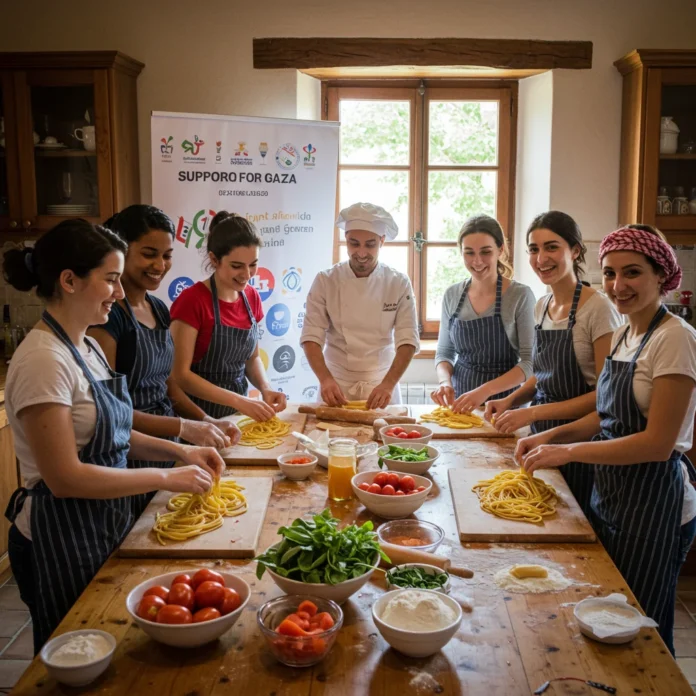Introduction: Cooking for a Cause in Florence
Florence is known for its rich culinary traditions and tight-knit community. Recently, it played host to a unique event that combined the love of food with a meaningful mission: supporting humanitarian relief efforts in Gaza. This pasta class wasn’t just about perfecting tagliatelle or learning new flavors. It was an opportunity for locals and visitors to make a real difference, turning their passion for cooking into tangible support for those in need.
The event drew people from diverse backgrounds, each motivated by the desire to help and to connect through food. The aroma of fresh pasta dough mingled with a sense of purpose, creating a memorable atmosphere that lingered long after the last plate was served.
What Inspired the Florence Pasta Class for Gaza?
The idea for the Florence Pasta Class for Gaza grew out of deep concern for the escalating humanitarian crisis in the region. Organizers wanted to do more than simply raise awareness—they aimed to create an experience where participants could actively contribute while learning new skills.
Inspired by similar initiatives across Europe, the team recognized the power of shared meals to unite people for a cause. The event was envisioned as a way to channel the community’s culinary enthusiasm into direct, meaningful assistance for Gaza.
Background: The Humanitarian Crisis in Gaza
Gaza has faced years of conflict, resulting in widespread shortages of food, medicine, and basic services. The ongoing crisis has left many families struggling to meet their daily needs, with humanitarian organizations working tirelessly to provide support.
Events like the pasta class are designed to raise both funds and awareness, reminding participants that even small actions can have far-reaching effects. By coming together in Florence, attendees contributed to relief efforts that offer hope to those affected by the crisis.
Why Support Gaza Through Culinary Events?
Culinary events offer a unique way to connect people with important causes. Cooking classes in particular provide an interactive, hands-on experience that goes beyond traditional fundraising methods.
By supporting Gaza through a pasta class, organizers tapped into the universal language of food. This approach not only raises money but also fosters empathy and understanding, creating a stronger sense of global community.
Overview of the Florence Pasta Class
The Florence Pasta Class was carefully crafted to blend education, entertainment, and philanthropy. Participants enjoyed expert instruction, delicious food, and the satisfaction of knowing their efforts would benefit those in need.
From the initial planning stages to the final applause, every aspect of the event was designed to maximize impact and enjoyment.
Who Organized the Pasta Class?
A group of dedicated volunteers and local chefs spearheaded the initiative, collaborating with humanitarian organizations to ensure the event’s success. Their passion for both food and social justice was evident in every detail.
The organizers brought together resources from across Florence, leveraging relationships with local businesses and community leaders to maximize participation and fundraising potential.
Meet the Chefs and Volunteers
The culinary team featured renowned chefs from Florence’s vibrant food scene, each bringing their own specialties and teaching styles. Volunteers handled logistics, registration, and guest support, ensuring a seamless experience for every participant.
Many volunteers shared personal connections to Gaza or have participated in similar events, adding a layer of authenticity and empathy to the proceedings.
How Was the Event Planned and Promoted?
Planning for the pasta class began months in advance, with organizers coordinating schedules, sourcing ingredients, and designing the curriculum. Promotion relied on social media, local news outlets, and word of mouth to reach a wide audience.
The team also partnered with local businesses, who contributed ingredients, equipment, and venue space. This collaborative approach helped build excitement and ensured that the event reached as many people as possible.
Location Spotlight: Where Was the Class Held in Florence?
The event took place in a charming Florentine cooking studio, nestled in the city’s historic center. Sunlight filtered through tall windows, illuminating marble countertops and rustic wooden tables where participants gathered.
The venue’s atmosphere was both welcoming and inspiring, providing the perfect backdrop for learning new techniques and making new friends. The aroma of fresh herbs and simmering sauces filled the air, making every moment feel special.
What Dishes Were Taught at the Pasta Class?
Participants learned to prepare a selection of classic and innovative dishes, each chosen to showcase the versatility and beauty of Italian and Palestinian cuisines. The menu reflected a careful balance between tradition and creativity.
Every dish was designed to be both accessible for home cooks and impressive enough for special occasions. The result was a feast for the senses and a celebration of culinary heritage.
Classic Italian Pasta Recipes Featured
The class began with beloved Italian favorites, such as tagliatelle al ragù and ricotta-stuffed ravioli. Chefs guided participants through each step, from kneading dough to shaping perfect pasta ribbons.
Participants also learned the secrets behind sauces that have made Italian cuisine famous worldwide. For those interested in expanding their pasta repertoire, our post on Rome’s Ultimate Cooking Class: Pasta & Tiramisu Secrets offers more inspiration.
Fusion Dishes: Italian and Palestinian Inspirations
To highlight the event’s purpose, the menu included fusion dishes blending Italian techniques with Palestinian flavors. Dishes like za’atar-infused gnocchi and sumac-laced pasta salads delighted guests with their bold, unexpected combinations.
These creations sparked lively discussions about culinary traditions and cultural exchange, adding depth to the hands-on experience.
Step-by-Step: How the Cooking Class Unfolded
The event followed a well-structured schedule, balancing learning, cooking, and community building. Attendees moved through each stage with enthusiasm, guided by experienced chefs and volunteers.
Every moment, from registration to the final meal, was designed to engage and inspire.
Registration and Welcome Activities
Guests were greeted with warm smiles and welcome drinks, setting a relaxed and inviting tone. Registration was efficient, with volunteers providing name tags, aprons, and a brief overview of the day’s activities.
Icebreakers encouraged participants to introduce themselves, share their motivations, and build connections before the cooking began.
Hands-On Pasta Making: A Participant’s Experience
Participants rolled up their sleeves and dove into the tactile joys of pasta making. The feel of cool, flour-dusted dough under their palms, the rhythmic motion of kneading, and the satisfaction of cutting perfect shapes brought smiles all around.
The kitchen buzzed with laughter and friendly competition as teams worked together. For those who enjoy hands-on culinary adventures, the Frascati Foodie Tour offers another memorable pasta-making experience.
Interactive Q&A Sessions During the Class
Throughout the class, chefs paused to answer questions and share tips. These interactive moments allowed participants to deepen their understanding, from perfecting pasta texture to learning about the spices used in Palestinian dishes.
The open dialogue fostered a sense of camaraderie and made the experience even more rewarding.
Who Attended the Event?
The pasta class attracted a diverse group, united by their love of food and desire to help others. Attendees ranged from seasoned home cooks to first-time pasta makers, each bringing unique perspectives and stories.
The event’s inclusive spirit encouraged participation from locals and visitors alike, enriching the overall atmosphere.
Participant Demographics and Motivations
Attendees included students, families, tourists, and professionals. Some came to sharpen their culinary skills, while others were motivated primarily by the desire to support Gaza.
Several participants mentioned that the event’s charitable focus was the deciding factor in their choice to attend.
Local Community Involvement
Florentine residents played a vital role in the event’s success, volunteering their time and resources. Local businesses donated ingredients, while community organizations helped spread the word and recruit participants.
The collaborative effort highlighted Florence’s tradition of generosity and civic engagement.
International Attendees and Their Stories
Travelers from across Europe and beyond joined the class, eager to connect with new friends and support a worthy cause. Many shared stories of similar events in their own countries, creating a sense of global solidarity.
Some participants even extended their stay in Florence to be part of the event, making it a highlight of their trip. If you’re planning an Italian culinary adventure, you might also enjoy our insight into the Amalfi Coast Culinary Class.
How Did the Pasta Class Raise Funds for Gaza?
Fundraising was at the heart of the event, with every aspect designed to maximize contributions for humanitarian relief. Organizers emphasized transparency and impact, ensuring donors felt confident in their support.
Multiple channels were used to collect donations, making it easy for everyone to participate.
Ticket Sales and Donation Mechanisms
Tickets for the class were priced to cover both event costs and a significant donation to Gaza relief. Attendees could also make additional contributions online or at the venue.
A secure payment system allowed for easy processing, with real-time updates on fundraising progress displayed throughout the day.
Additional Fundraising Activities at the Event
Beyond ticket sales, the event featured a silent auction with items donated by local artists and businesses. Raffle tickets and a bake sale table offered more opportunities to give.
These activities not only raised extra funds but also created a festive atmosphere, engaging participants in friendly competition for a good cause.
Transparency: Where Do the Funds Go?
Organizers prioritized clarity about how funds would be used. Detailed breakdowns were shared with attendees, outlining the specific programs and organizations receiving support.
Updates were promised post-event, allowing donors to track the impact of their contributions over time.
Partner Organizations and Charities Supported
Proceeds from the pasta class benefited established humanitarian groups working directly in Gaza. These organizations have a proven track record of delivering vital aid, including food, medical supplies, and shelter.
By partnering with reputable charities, organizers ensured that every euro raised would make a meaningful difference.
How Are Donations Distributed to Gaza?
Funds were transferred through secure channels, with oversight from both local and international partners. Regular reporting and documentation provided accountability at every stage.
The transparent process built trust among participants and encouraged ongoing support for future initiatives.
Impact Stories: How Cooking Events Make a Difference
The Florence Pasta Class was more than a fundraiser—it was a catalyst for personal and collective transformation. Attendees left with new skills, new friends, and a deep sense of accomplishment.
The event’s impact reached far beyond the kitchen, touching lives in Gaza and Florence alike.
Personal Testimonials from Beneficiaries
Recipients of aid in Gaza shared heartfelt messages of gratitude, describing how donations provided food, medicine, and hope in challenging times. These stories were read aloud during the event, reminding everyone of the real people behind the cause.
Such testimonials underscored the significance of every contribution, no matter how small.
Quotes from Event Participants
Many attendees expressed appreciation for the event’s unique blend of education and activism. One participant noted, “I came for the pasta, but I left feeling part of something much bigger.”
Others praised the welcoming atmosphere and the opportunity to learn new recipes while giving back.
Messages from Gaza: Voices of Gratitude
Organizers shared video messages and letters from families in Gaza, expressing thanks for the support received. These voices brought the cause to life, forging a powerful connection across continents.
The emotional impact of these messages lingered, inspiring attendees to continue their involvement in humanitarian efforts.
The Power of Food in Building Solidarity
Food has a unique ability to unite people across cultures and backgrounds. The Florence Pasta Class demonstrated how culinary experiences can spark empathy and action for global causes.
Through shared meals and collaborative cooking, participants found common ground and built lasting bonds.
Why Cooking Classes Are Effective Fundraisers
Cooking classes engage all the senses, making them memorable and impactful. They offer participants a tangible skill while raising money in a way that feels enjoyable and rewarding.
For those interested in similar experiences, our Vatican Pasta & Gelato Class showcases another creative approach to culinary fundraising.
How Food Bridges Cultures and Causes
By blending Italian and Palestinian cuisines, the event highlighted the power of food to foster understanding and appreciation. Cooking together encouraged dialogue and broke down barriers, creating a sense of unity.
This cultural exchange enriched the experience for everyone involved, deepening both culinary knowledge and social awareness.
Media Coverage and Social Media Highlights
The pasta class attracted significant attention from both local media and online communities. Coverage helped amplify the event’s impact, inspiring others to support similar initiatives.
Organizers used media exposure to share success stories and encourage ongoing engagement.
Press Mentions and Local News Reports
Florentine newspapers and TV stations featured in-depth coverage of the event, highlighting its unique approach to fundraising. Interviews with chefs, volunteers, and participants provided personal perspectives on the day’s significance.
These reports generated further interest and encouraged more people to get involved in future events.
Social Media Campaigns and Hashtags Used
Social media played a crucial role in promoting the class and sharing real-time updates. Organizers used hashtags like #CookingForGaza and #FlorenceForPeace to connect with a global audience.
Participants posted photos and stories, spreading the word and inspiring their networks to support the cause.
Photo Gallery: Memorable Moments from the Event
Images from the class captured the joy, camaraderie, and concentration of participants. Photos showcased flour-dusted hands, colorful pasta creations, and heartfelt embraces between new friends.
These visual memories served as a testament to the event’s success and the power of food to bring people together for a purpose.
How Can You Get Involved or Support the Cause?
There are many ways to continue supporting humanitarian efforts in Gaza, whether through future events, donations, or volunteer work. The Florence Pasta Class is just one example of how collective action can make a real difference.
By staying engaged and informed, you can help build a more compassionate and connected world.
Upcoming Cooking for a Cause Events in Florence
Organizers are already planning future cooking classes and food-based fundraisers. These events will continue to blend culinary education with meaningful support for global causes.
Keep an eye on local event listings and community boards for announcements about upcoming opportunities.
Ways to Donate or Volunteer
If you’d like to contribute, consider making a direct donation to one of the supported organizations or signing up as a volunteer for the next event. Every effort counts, whether you’re slicing vegetables or helping with logistics.
Many charities also offer online giving options, making it easy to support from anywhere in the world.
Tips for Hosting Your Own Fundraising Cooking Class
If you’re inspired to organize your own event, start by choosing a cause that resonates with your community. Partner with local chefs, secure a suitable venue, and promote your class through social media and word of mouth.
Be transparent about how funds will be used, and consider incorporating fun activities like raffles or auctions to boost participation.
Resources for Learning More About Gaza and Humanitarian Aid
Staying informed is key to making a positive impact. There are many resources available for those who wish to deepen their understanding of the situation in Gaza and the broader context of humanitarian aid.
Whether you prefer to read, watch, or engage with organizations directly, there are options to suit every learning style.
Recommended Books, Documentaries, and Articles
Several books and documentaries provide in-depth insights into Gaza’s history, culture, and current challenges. Articles from reputable news sources offer up-to-date information and analysis.
Engaging with these resources can help you become a more informed and effective advocate for change.
Organizations Making a Difference in Gaza
Numerous non-profits and NGOs are actively working to deliver aid and support in Gaza. Researching these organizations and their programs can help you identify where your contribution will have the greatest impact.
Consider subscribing to their updates or attending informational webinars to stay connected with ongoing efforts.
Frequently Asked Questions About the Pasta Class and Fundraiser
Many people have questions about how they can participate, contribute, or measure the impact of events like the Florence Pasta Class. Here are some answers to common inquiries.
If your question isn’t covered here, organizers encourage you to reach out directly for more information.
How Can I Join Future Cooking for a Cause Events?
Future events are typically announced on the organizers’ social media pages and community networks. Signing up for newsletters or following local event calendars is a great way to stay informed.
You can also find tours and book activities through trusted platforms to support similar initiatives.
Are There Virtual Participation Options?
Some cooking classes offer virtual attendance, allowing supporters from around the world to join via livestream or pre-recorded sessions. These options make it easier for everyone to participate, regardless of location.
Check event listings and organizer websites for details about upcoming virtual opportunities.
How Is the Impact Measured and Reported?
Organizers provide regular updates on fundraising totals and project outcomes. Transparent reporting ensures that participants and donors can see exactly how their contributions are making a difference.
Many events share post-event reports, photos, and testimonials to highlight the impact achieved.
How to Book on Viator
Booking a culinary class or other activity in Florence is easy with Viator. Simply visit the Viator website to browse available experiences, read reviews, and secure your spot.
Viator’s platform offers a wide selection of classes and tours, making it simple to plan your trip and support meaningful causes along the way.
Conclusion: The Lasting Impact of Cooking for a Cause in Florence
The Florence Pasta Class proved that food has the power to unite, heal, and empower. By bringing people together in the kitchen, the event created ripples of solidarity that reached all the way to Gaza.
Whether you attended, donated, or simply shared the story, your involvement mattered. Initiatives like this remind us that small acts of kindness can have a global impact. For more inspiration and to connect with a community dedicated to meaningful travel and experiences, visit Izase.
Disclaimer: This information is accurate to the best of our knowledge; however, there may be changes or mistakes. Please verify exact details on the Viator booking page.


